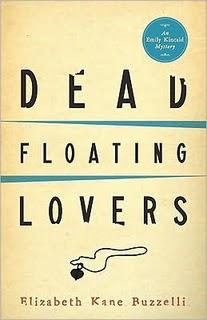Dead Floating Lovers

Set in the lush landscape of upper Michigan, Dead Floating Lovers (the second in Elizabeth Kane Buzzelli's series of the Emily Kincaid mysteries) chronicles the experiences of aspiring mystery writer Emily Kincaid, who is enmeshed in one investigation after another as a journalist-cum-sidekick for the local law—her friend Deputy Dolly Wakowski.
Floating in a remote upper Michigan lake, Deputy Dolly discovers bones that she thinks belong to her ex-husband (he disappeared some thirteen years prior), or the Native American girl he ran off with. Determined to find out whether her ex-husband is the victim, or perhaps even the murderer, Dolly and Emily set out on a goose chase after Dolly’s long-lost family and wade through Native American tribal land and law where neither woman navigates comfortably.
As mysteries go, this one isn’t particularly gripping, and I won’t give away the details. The mystery itself (Who was killed? Who is the killer? Why?) is anticlimactically revealed. Mysteries typically employ some element of danger, and perhaps it is a testament to my desensitized nature that the danger in this mystery wasn’t nearly palpable enough. For this quick and easy read, the place setting, characters, and fairly predictable relationship scenarios comprise the more entertaining elements of the book.
Emily Kincaid fled from Ann Arbor and her broken marriage to Jackson Rinaldi, a pompous lothario of an academic. His purposefully overdone character convinces the reader to immediately side with Emily—Jackson drives a Jaguar, tosses scarves over his neck and shoulders, and is passionately engrossed in writing a book about T_he Canterbury Tales_. Oh—he speaks Italian and he can’t keep it in his pants around younger female grad students. Yet Jackson still holds sway over Emily—an all-too-familiar trope. Luckily, the hard-nosed and law abiding Deputy Dolly is always on hand to remind Emily (albeit unsuccessfully) that Jackson’s looming presence in her life only ends in heartbreak. And yet Dolly’s story is surprisingly similar. Dolly is inexplicably faithful to her long-gone husband (continuing to call him her “husband” and insisting on loyalty to one’s “family”) who after six months of marriage took off with another woman.
As delightful as it can be to read novels with women protagonists, what is mysterious here is that both women feel strong obligation to the men whose love for them seemed dead from the start. Both Emily and Dolly fall into a pattern I’ve been seeing lately in both print and on the screen, of women who fit into emotional extremes without leaving room for a middle ground. Dolly is exaggeratedly unemotional, and showing emotion seems to wound her soul in some unmentionable way.
Out of their unlikely friendship Emily is pitched as the “smart” one who should know better than to let herself be emotionally unwound by a man who comes off as skeezy, for lack of a better word—let alone force herself to achieve perfection for him when she says, “I wanted everything perfect when Jackson came to dinner. A wild, atavistic urge to feed a man came over me. Must’ve been straight down from a grandmother I’d never met; from back in the times when a woman caught herself a productive male or perished.”
Though I am starting to think I would prefer a bit more balance among women protagonists, the ways Emily and Dolly navigate the men whose presence (or absence-as-presence) is injected in their lives successfully propel the book and entertain the reader when the mystery lags. However, through their dramas Buzzelli succeeds at addressing a larger significant reality outside the story itself—that when it comes to relationships, physical extraction rarely equals emotional extraction.